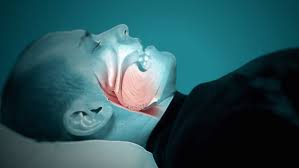What is Sleep Apnea?
Obstructive Sleep Apnea (Apnoea)(OSA) is a sleep-related breathing disorder that involves a decrease or complete halt in airflow despite an ongoing effort to breathe. It occurs when the muscles relax during sleep, causing soft tissue in the back of the throat to collapse and block the upper airway. These muscles include the tongue, soft palate, uvula and muscles of the neck. As pressure builds up due to lack of inflow and outflow of air from our lungs, our brain sends strong signals to the diaphragm (which is the big muscle just above the stomach and below the lungs) to work harder which also interrupts sleep. Depending on how long sleep is interrupted, OSA is classified as mild, moderate or severe.
During sleep apnea, the tongue collapses in the back of the throat, resulting in an airflow reduction of 80-100% for a period of at least 10 seconds. These 10 seconds are enough to drop the blood oxygen level by 3-4%.

What can cause Obstructive Sleep Apnea?
Although the science behind this is still quite unclear, we have found a few factors that can contribute to this:
- Malpositioned or Smaller than normal lower jaw or upper jaw.
- Enlarged tonsils.
- Fat buildup around the neck. (size of the neck)
- Position during sleep.
- Aging and sagging of muscles.
How is Sleep Apnea different than Snoring?
Snoring can be a warning sign that there is some obstruction. Flapping of the uvula, epiglottis and tongue by the inflow and outflow of air to our lungs when these muscles are relaxed and collapsed causes snoring. Snoring on its own is not dangerous but is often annoying to your partner and those around you. Snoring can easily be fixed by using several available anti-snoring devices but first an assessment must be made that there is no sleep apnea.
Approximately 91% of all apnea patients snore, however not everyone who snores has sleep apnea. Snoring occurs in 40 to 50% of the general population. It is a sign indicating something is wrong with the airway and breathing during sleep.
How is Grinding related to Sleep Apnea?
We are not entirely sure yet but scientists have found a very significant and strong link between bruxism (grinding) and snoring/sleep apnea. Scientists believe the same brain signals that interrupt our sleep are responsible for activating our jaw muscles inadvertently causing us to grind at night. This can happen as often as 10-20 seconds every minute!
Is Bruxism Normal in Children?
The short answer is NO. Although, still controversial, we believe some grinding/clenching is normal in children as it is a way to train their muscles by activating them. Studies have shown that lack of regular activation and the disuse of muscles leads to muscle hypotrophy and eventually smaller than normal sized jaws. We strongly believe that our muscles play a huge role in driving and guiding the growth of our jaws. The growth of our jaws typically stops at the age of 12-14 for boys and 10-12 for girls. We typically like to see grinding in children stopping by this age as well.
Is Snoring Normal in Children?
The answer is a definite NO. Although snoring and bruxism are related to each other, snoring in children is a sign of something bigger hiding under the symptoms and signs. Sleep Apnea is a serious issue in children and although sometimes it can self-correct with the growth of jaws, it usually does not. An assessment will have to be made to determine if the snoring is due to allergies, enlarged tonsils, smaller jaws, etc so the child can be treated appropriately. The good news is at this age, a lot can be done with jaw growth to mitigate future risk factors for sleep apnea.
What are the effects of Sleep Apnea?
The short term effects of sleep apnea are:
- daytime sleepiness, headaches.
- decreased attention and increased incidence of vehicle accidents – CAA reports that as much as 50,000 car accidents in Canada happen due to sleepy drivers.
- increased risk of diabetes.
- increased risk of hypertension and other cardio-vascular problems.
- increased risk of stroke and atrial fibrillation.
- increased risk of gastroesophageal reflux (GERD).
- mood disturbances, cognitive memory loss, obesity and hormonal imbalances.
How Can Stouffville Smiles Dentistry Help Me with Sleep Apnea or Snoring?
During your comprehensive examination with us, we assess your muscles, tonsils, size of the tongue, grinding and wear pattern on your teeth, signs of acidity and reflux to determine if sleep apnea might be something to investigate further. We will make referrals and recommendations to your family doctors to assess you for sleep apnea which typically involves going to a sleep clinic. Depending on what is causing the sleep apnea, the following or a combination of them may be the treatment:
- Orthodontics / Orthognathic Surgery to correct jaw position and size.
- Removal of Tonsils.
- Weight Loss and dietary changes.
- Oral Sleep Apnea Appliances.
- Snoring Appliances.
- CPAP Machine.
We work with your family physician and specialists to remove the cause of sleep apnea or mitigate the effects.
Ask us how we can help you get a better night’s sleep!

